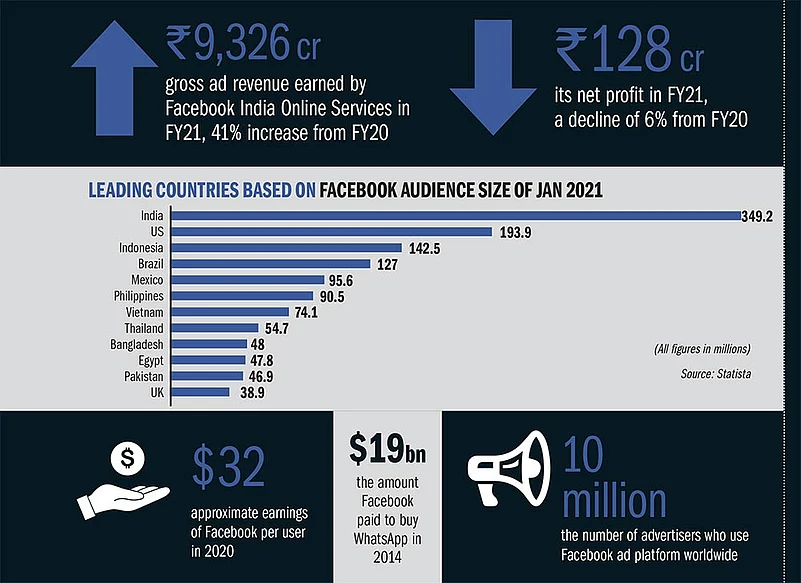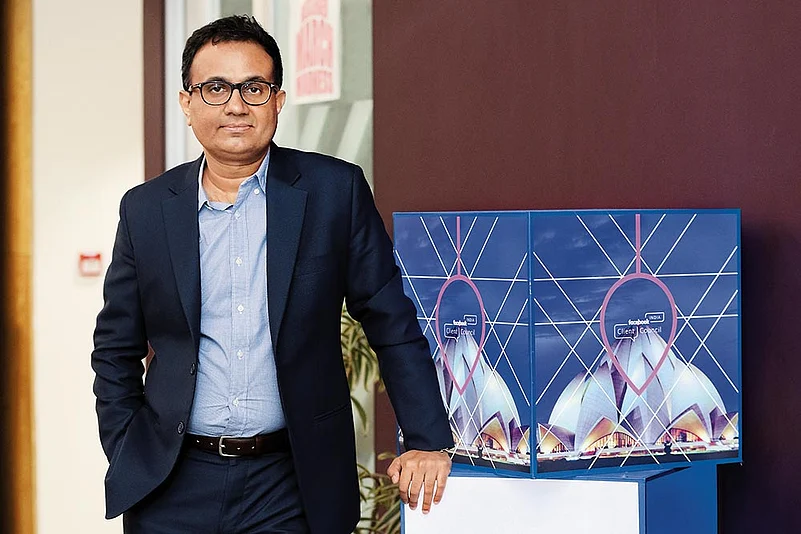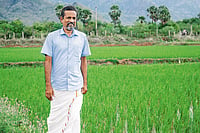In September 2006, Facebook hit our computer screens for the first time, redefining our social interactions forever. 15 years later, India is Facebook’s largest market with over 430 million people using the app. In 2014, Facebook (now Meta) acquired WhatsApp and looked unstoppable in India. But since then, the rise of fake news and hate speech on its platforms emerged as gigantic problems for the social media behemoth. While Meta, in its defense, has made significant investments in the area of safety and security since 2016, critics continue to hit out against its algorithms. As it metamorphoses into Meta, the company promises more immersive experiences and deeper innovations. In India small entrepreneurs are in focus – it plans to train 10 million entrepreneurs and 250,000 creators at its state-of-art C-Fine centre in the coming years. Outlook Business speaks to Ajit Mohan, vice-president and managing director, Facebook India (Meta) to understand why and how the company is sharpening its India focus

Facebook India Online Services’ gross advertising revenue grew 41 per cent to Rs 9,321 crore in FY21. How do you plan to keep up the growth momentum?
When we look at India, we don’t start with revenue. We look at it in two ways—one, it is the largest country for Instagram, WhatsApp and Facebook and therefore, very consequential. Second, is the context of the country itself. A lot of people have come online due to affordability of and access to high-quality internet in a short period of time. That kind of a shift where you have had well north of 700-750 million people coming online in just five years—which hasn’t happened even in China—is phenomenal.
In that context, we made a few choices a few years ago. One was to focus on the agenda of entrepreneurship and small businesses. We realised that although hundreds of millions of people had come online, most companies were focused only on the top 50 or top 100 million. We bet on the agenda of making it easier for smaller businesses to use our platforms and to grow in scale both domestically and internationally. Our second bet was on Instagram because we knew that in a country as young as this, there is a tradition of creative expression. Instagram had made India a focus country back in 2019—well before the rise of Reels. We saw the opportunity behind short-form video and went on to build a product that was India-centric. That’s the story of Reels which, in many ways, originated in India—the pilots were done here, the first scaling was done here and it’s the Reels model that has gone global and done extremely well.
Our third bet, from an economic point of view, was online commerce. Our ad platform, where advertising leads to action, has always been particularly useful for small businesses We believe that if we do the right thing for creators, for small businesses, eventually we will benefit in terms of revenue growth for ourselves.
That is what has happened. Out of the 41 per cent growth that we saw for FY21, a quarter fell in the March-April-June 2020 period when most of the country was shut down.
Tell us about Metaverse and its relevance to India.
If you look at the last few years, since the acquisition of Oculus in 2014, there has been a lot of investment in fundamental research and product work that we haven’t talked a lot about. Today, when you wear the Quest 2 headset, you will realise the massive improvement in the device as compared to the last few years. A lot of this wouldn’t have happened without intentional effort and investment. We have the opportunity to contribute to the building of a more immersive and more embodied version of the internet than the mobile. And, we are well-positioned to contribute to it because of what we are building in AR (augmented reality) and VR (virtual reality) through the apps that we have. We see a direct line from Facebook, Instagram and WhatsApp into how we can leverage those to help the social technologies that will underline the Metaverse. From a platform point of view, we can contribute to the many blocks that will constitute the making of the Metaverse. That explains the timing. As a company, we are going to put in all our energy from an engineering, investment and partnership point of view.
Meta’s first standalone office hosting the Centre for Fuelling India’s New Economy (C-FINE) has just come up in Gurugram. Have any tech advancements been integrated in the building?
We believe that the future of work is going to be influenced by a lot of technologies that we are building, including the Horizon Workrooms. It is about making it easy for people to work remotely and to create the essence of each other’s presence. Also, we can use the space to connect with the communities around us. Given the nature of our platforms, we are fundamentally in the business of connecting people and communities, and connecting businesses. That means that even our physical space has to embody that. The way we conceptualised that was the way we created the centre by thinking of it as a place where people can get trained and get exposed to cutting-edge technology. We plan to train 10 million entrepreneurs and 250,000 creators at the centre in the coming years.

Facebook started off as a great tool for people to connect with friends and family. Now, your evolution means your algorithm will prioritise commercials over individual posts. How do you see these two strategies marrying?
I don’t think we prioritise commercials. The maximising function of the algorithm is how to produce relevant content for an individual. The big shift a few years ago was the algorithm essentially prioritising friends and family over commercial content. The bet was on people seeing content from friends and family rather than from public sources—even if they are going viral. People do see ads on the feed but there are very strong policies on what kind of ads marketeers can put up. There are very tight numbers of ads that a particular user can see. Consumers have never complained about it. They understand that it is because of the ads that we have been able to keep a very useful service free for everyone and second is the power of personalised ads. It’s the same ad engine that drives ads on both Facebook and Instagram. Users don’t see it as a disturbance to the experience. They see it as an addition to the experience.

Free Basics, the plan that Facebook wanted to succeed in India, had to be shelved following allegations of monopoly. Reliance, too, has a history of creating monopolies in the segments it operates in. Do you think your deal with Jio can bring back similar accusations for both the companies?
There isn’t much connection between the two. The principle of neutrality remains. I think when we announced the investment in Jio a year and a half ago, we also announced the partnership between WhatsApp and JioMart. We enabled the digitisation of the kiranas stores in India and to make it easy for people from across the country to order from these shops, we didn’t make the partnership exclusive. So, it doesn’t prevent either Jio or Meta, as companies, from working with others.

Also, the partnership was approved by the Competition Commission of India which is the agency that ensures that competition remains intense in the market. If you look at any segment in India—commerce, social media, messaging—there is competition everywhere. I have only seen a positive assessment of the partnership that it is fundamentally an opportunity to connect the scale of WhatsApp to the reality that most offline commerce in India continues to be the kirana stores.
Some reports suggest that youngsters are weaning off social media. Do you see a saturation point for the Facebook app and perhaps a bigger growth momentum for Instagram and WhatsApp?
We have more than 434 million users on Facebook in India. And, as per the numbers disclosed over the last few years, we are continuing to grow in Facebook (the app), Instagram and WhatsApp. The propositions of the three apps are very different—for WhatsApp, the promise is of private messaging, for Facebook it is the promise of connecting with people and for Instagram, it is about following interests. The distinctness of the proposition is relevant as newer players are coming into the internet. So, when you ask me if the growth of Instagram is happening at the cost of Facebook or if one is not growing as much as the other, the answer is no.
As per your website, Facebook disabled more than 1.3 billion fake accounts between October and December of 2020. How did your system allow so many fake accounts to be created before they were caught? How are you dealing with this problem?
When we disclose fake accounts being taken down, it doesn’t mean that those accounts have been around for months and years. The algorithm invariably picks up fake accounts, often within minutes and hours of them being created. Many of these accounts are taken down instantly or as soon as they exhibit a behaviour that allows us to recognise that they are fake or spam accounts. In the area of safety and security, we have made an investment of $13 billion since 2016 with $5 billion coming in this year alone.
Our community standards are our public articulation of the kind of content that we don’t allow. That includes enticement to violence, targeting people and hate speech. It has an economic incentive as well because advertisers don’t like it. If anything, we are spending more and more money on the agenda of safety and security. We have added more than 35,000 people in the last few years alone and the way it works is by investing in building algorithms that can detect offensive content, very often even before they get published or get distributed on the platform.
I don’t think there’s any other company, either in India or elsewhere, that has done as much as we have to invest in safety and security and be transparent about their policies.
The prevalence of hate speech on our platforms is .03 per cent. It has come down dramatically over the years. I think, as a company, we are doing the right thing.
Meta is also planning to expand the Facebook Protect Programme in India. How can more people be brought under its radar?
Facebook Protect is a security programme that helps people who might be at a higher risk of being targeted online for account compromise. These groups include human rights defenders, journalists and elected officials. We piloted the programme in the US in 2019 and are now expanding it to more countries around the world, including India. We have a range of security measures in place to ensure that all our users are protected and we proactively notify users when we believe they are being targeted.
The world over, news publishers are lobbying with national governments to force social media giants like Meta to share revenue with publishers. How do you think this will pan out?
We have focused on building partnerships with companies, including news and media. I believe it is a win-win situation for both of us. We add value for them and we benefit from their expertise, including many of their contributions in the fact-checking programmes.
The markets that we operate in continue to be intensely competitive and we expect that to continue. I think we are doing well in India across Facebook, Instagram and WhatsApp. I can’t think of platforms that are more immersed in the fabric of India. When you think about what would have happened if so many people wouldn’t have been online and if Facebook, Instagram and WhatsApp wouldn’t have existed, you will realise the role that we play in India.
TikTok dominated the short video space until it was banned in India. What is your focus in the short-video space?
India has become a video-first market and 70-80 per cent of all data in the country is on video. Given the predominant role of video in driving online consumption and social experiences, it is a huge priority for Meta.
It has been a year and a half since Instagram Reels has been around. Today, it is a growing space globally where brands and creators can be discovered by anyone. That’s because Reels is the best place on Instagram to reach people who don’t follow you. It has transformed the way content is created and consumed on Instagram and given rise to a whole new wave of young creators.
***
Meta’s five key projects in India
Small Business Loans Initiative
Globally, 200 million businesses — mostly small ones – use one of Meta’s apps every month. The social media giant recently launched the Small Business Loans Initiative to help address the challenge of credit faced by small businesses in India
Payments on WhatsApp
With ‘payments on WhatsApp’, the company wants to deliver a simple, reliable and secure experience for WhatsApp users that can accelerate adoption of UPI, for the “next five hundred million” Indians
Born on Instagram
Aimed at making access to creator education more scalable and democratised, Meta has launched creator e-learning programs -- Born on Instagram – for tens of thousands of creators across India
Centre for Fuelling India’s New Economy (C-FINE)
Created at Meta’s new office in Gurugram, C-FINE is to become a centre for excellence for India’s new age entrepreneurs -- a place that will provide them access to training, resources and people -- all facilitated by Meta
Facebook Pragati
Powered by N/Core (The/Nudge Centre for Social Innovation), the programme aims to assist in incubating and accelerating early-stage women-led nonprofits that are working in the areas of women entrepreneurship and to drive awareness and adoption of technology among women
***

Muskan and Pranav Malhotra are taking Pashtush to 120 countries through Instagram and Facebook
Changing Lives
Pashtush
Pranav Malhotra, MD, Pashtush – a manufacturer of exquisite shawls, scarves, etc. – is able to take his family business brand to 120 countries through Instagram and Facebook. By bringing his brand on the social media platforms, Pranav says he has been able to solve the problem of middlemen, high prices and a once seasonal business, now runs round the year as they are able to send products across the globe. Growing at a 2.5x rate during the pandemic, Pashtush has helped thousands of weavers across Kashmir, Punjab and Himachal Pradesh generate livelihood.
RogStream (Aparna Shukla)
It’s interesting to know that India’s biggest female Facebook Gaming creator with over 2.2 million followers is a girl from Kanpur (UP). For Aparna, what started as a fun activity on her mobile soon became a passion, and she started streaming on Facebook. Realising her seriousness, her father got her equipment for good-quality streaming and Aparna soon understood the nuances of gaming as a profession. Today, she considers gaming and streaming as her full-time profession. Interestingly, India recorded 234 million game play sessions on Facebook in the two months during July- August this year, ranking 3rd globally in game play sessions for the specified time period.































